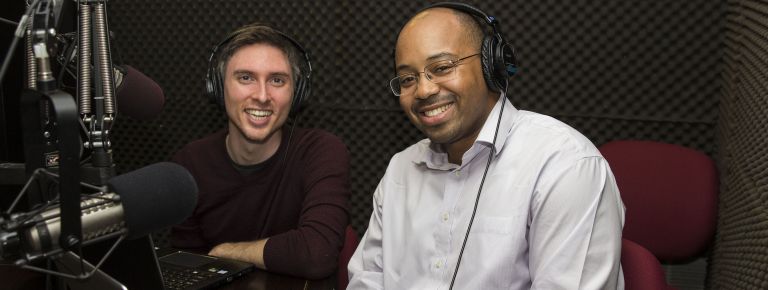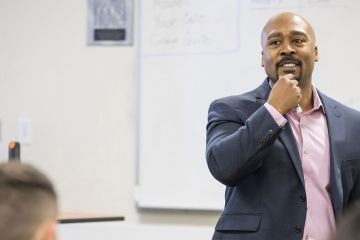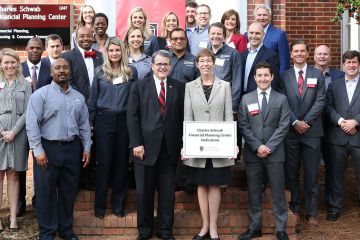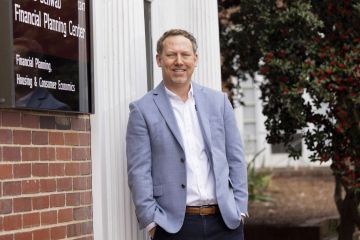Nothing Funny About Money
A new radio program, “Nothing Funny about Money,” was launched this year by a FACS faculty member and doctoral student to explore topics like these in hopes of making personal finance more accessible, less scary and maybe even fun.
Matt J. Goren, a faculty member in the FACS department of financial planning, housing and consumer economics, and doctoral student Michael G. Thomas Jr., record the show at WUGA in the Georgia Center for Continuing Education.
The show airs on WUGA and can be heard via live stream at www.wuga.edu or at www.nothingfunnyaboutmoney.org
Goren and Thomas met when both
began working on a financial literacy program, “Discovering Money Solutions,” part of a federally-funded outreach program led by FACS faculty member Ted Futris.
Goren expressed a desire to expand their reach, so he pitched the idea to Jimmy Sanders, station manager at WUGA, and a show was born. The duo recorded their first episode in November 2016.
Here, Goren and Thomas answer a few questions about the project.
What’s the premise behind the show and who do you consider your target audience?
Goren: Most of the personal finance resources available are dry, boring, and even rude. We want to be on the opposite end of the spectrum. Our intended audience is people who find personal finance a bit scary and frustrating but still need help. If someone finds this stuff fun on its own, great! We’re more aiming for the person who throws away the mail from the bank without opening it.
Thomas: Foundationally, I think we want our listeners to know that we are people with an expert opinion on a particular matter as opposed to experts with an opinion. We want to have a conversation with our audience and not speak at them or down to them. We want our audience to know that they are not alone on their financial journey. This show is intended for anyone who feels overlooked and lacks access to competent and compassionate financial service providers.
How do you come up with topics to discuss?
Thomas: Matt and I both read a lot and stay current on the latest happenings in personal finance. Once we have an idea, we spend some time brainstorming the financial and psychological components of the topic. When we are comfortable with that aspect of the process, we then try to find as many ways as possible to make the subject accessible, light-hearted and funny.
How do you prepare for a show?
Thomas: A lot of late nights! And, to be fair to Matt, he has been carrying more of the load than I have. This show would not be where it is without him driving it. That said, once we’ve gotten a script down, we try to our very best to capture the funny as much as possible. If that means I’m singing off key or Matt is barking like a miniature poodle to drive a point home, we’ll do it. We’ll read and re-write over and over again until we are both comfortable with the delicate blend of information, humor and sincerity we try to bring to each and every show. It’s a labor of love - we care!
How would you describe your friendship?
Goren: Michael and I both want to “make the world a better place” and focus a lot of our energy into social entrepreneurship. We agree that the best long-term solutions to the nation’s growing inequity is to create sustainable models that promote equity. Say, for example, finding a way to make money providing pro bono advising and connecting lower-income clients with halfway decent financial institutions. The bar in this world is extremely low: the typical low-income person is more likely to get “advice” from a salesperson than a fiduciary; they’re as likely to use predatory lending with accompanying high interest rates as to have a checking account. So, we’ve got this idea - if we can do something, it’s better than the disaster status quo.
We bonded a lot over this idea of doing what we can while building our own brand and trying to make a living. And we both have experience with many different delivery models. What works? What doesn’t? Between us, we’ve been at this a decade and have some strong opinions. The show is just one part of a broader effort to do more of the work we think will really help people.
Does winning the lottery actually make you less happy?
Two-thirds of Americans have less than $500 in savings. Planners recommend having three to six months’ worth of living expenses saved up ($5,000 to $10,000 for most Americans)
Average student loan debt for the 2017 graduating class is about $35,000
About half of 2017 professional degree graduates (law, med, etc.) have more than $200,000 in student loan debt
A recent ThinkAdvisor survey found that 68 percent of Americans don’t receive any financial advice
In 2014, the American College of Financial Services ran a financial literacy survey, finding only 20 percent of Americans “passed”
FINRA reports 22 percent of credit card holders were sent to collections in 2015





